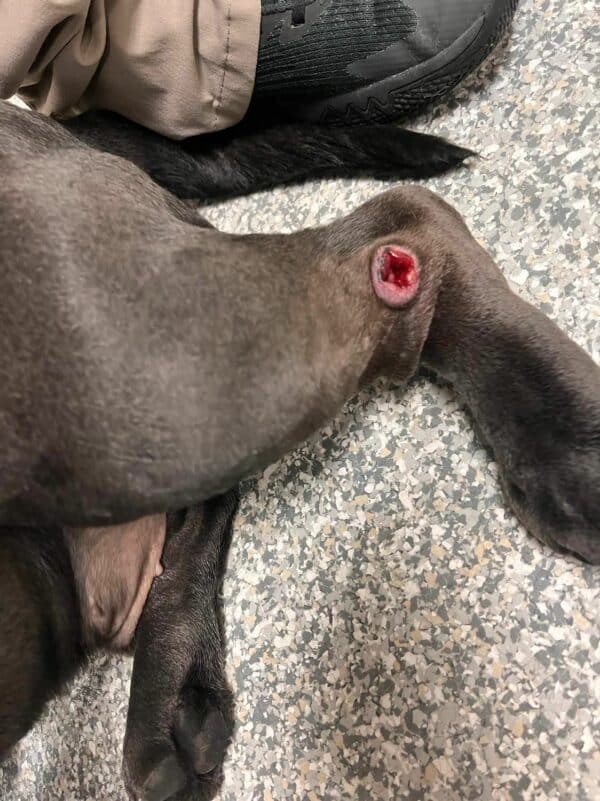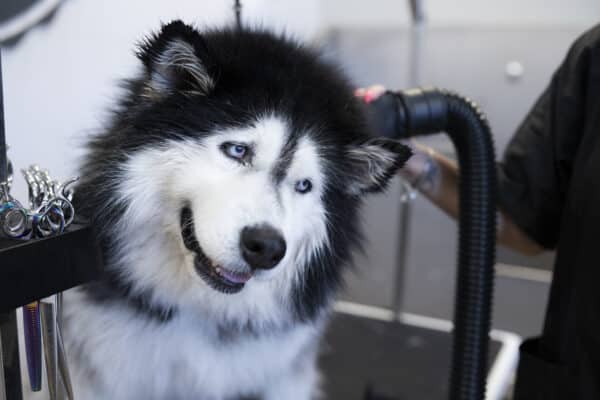Sometimes veterinarians don’t get the appreciation they deserve — this incident of old dog vestibular syndrome was one of those times.
The tale of Titus and old dog vestibular syndrome

“What do you mean ‘he’s all twisted up’?”
“Doc, he’s twisted to one side like a roly-poly. Poor boy can’t even get a drink of water for all that stumbling and staggering about.”
I was on my first phone call of the day with a senior man with an equally senior terrier named Titus.
“He’s been like this since yesterday. He vomited once or twice and can’t stand straight for more than a minute. His head keeps rolling to one side like he’s trying to flip upside down. I thought maybe he’d eaten a bad worm but he’s getting worse.”
I assumed “bad worm” was a metaphor, but it was early.
“The worms have been real bad after all this rain. Do you think that’s what it is?”
Note to self: Never assume anything in veterinary practice.
“I’m not sure.” I replied, running through my alarmingly short list of worm toxins. “Can you bring Titus in right away?” I needed to research poisonous worms in our area. And maybe grab another coffee.
An hour later I was looking at an admittedly “twisted-up” 13-year-old Terrier. Titus’s eyes were darting side to side in a classic case of nystagmus (a condition in which the eyes make repetitive, uncontrolled movements). Poor Titus couldn’t hold his head upright and kept falling to his right side as he involuntarily twisted and turned. Every second step he plummeted to the floor and rolled around until he could lurch upright.
I had a good idea what was wrong with Titus. “I feel pretty confident this isn’t from eating worms.” Titus’s owner let out a sigh of relief.
“Old dog disease”
Older dogs suffering from these sorts of symptoms often have a form of vestibular disease. The first step in diagnosis is determining whether the disease is “central” (from the brain or brainstem) or ‘peripheral’ vestibular disease (typically originating in the middle or inner ear). Central vestibular disease is often much more serious, whereas peripheral disease typically carries a more favorable prognosis.
First I did a careful neurological exam, testing the cranial nerves and reflexes, followed by a thorough eye and ear examination. Titus passed his neuro exam, there was no sign of infection, and no exposure to drugs or toxins other than the mysterious “worms.” This led me to conclude that Titus was most likely suffering from idiopathic vestibular disease, sometimes referred to as “old dog vestibular syndrome.”
Does old dog vestibular syndrome affect older dogs only?
“Is Titus old? I had another dog lived to be over 18. I don’t think that’s what it is. You sure it’s not worms?”
Idiopathic vestibular disease is somewhat common in older dogs.
It should be considered in any dog exhibiting sudden, progressive loss of balance, often accompanied by a head tilt. Most cases are caused by ear infections, but tumors, infections, trauma or certain medications can cause vestibular disease. There may be a worm that can cause similar symptoms if ingested, I just couldn’t find it in my textbooks.
“Thirteen isn’t that old, but it does make Titus a solid canine senior citizen. Based on my exam, I think idiopathic vestibular disease is the most probable cause for his symptoms. I’d like to run a few simple blood and urine tests to make sure there isn’t anything I’m missing.”
“Can you test for those worms?”
While I couldn’t promise that specific “worm test,” I assured the owner most serious conditions would show up on the tests. Thirty minutes later I was holding normal test results.
“This is great news! Titus appears to healthy other than this form of vestibular disease that strikes without warning or obvious cause. Even better, most dogs will get better within a week or two.”
Treatment options for old dog vestibular syndrome
I prescribed an anti-vomiting medication, meclizine, to ease nausea and upset stomach. We also gave Titus subcutaneous fluids to hydrate him and hand-fed a high-calorie food.
As we helped Titus to his car, his owner turned to me. “I still think it’s the worms. Gotta be. Titus isn’t an old dog, just a good one.” I couldn’t agree more.
The next day Titus returned, already feeling better. We gave more food and fluids, and his owner thought he could handle it from there. Titus improved over the next four days, until he was able to walk, eat and drink by himself.
Two weeks later a letter arrived. As I peered inside the envelope, I immediately knew who it was from. A hand-scribbled note was attached to a picture of an earthworm.
“Dear Dr. Ward, here is the worm that made Titus sick. Once I got rid of all the worms, he got better. Thought it might help someone else. Thanks again!”
Some days I get no respect, and that’s OK. I’m just glad Titus got better.
Thumbnail: Photography ©AmyDreves | Thinkstock.
About the author:
Dr. Ernie Ward is an internationally recognized veterinarian known for his innovations in general small animal practice, long-term medication monitoring, special needs of senior dogs and cats and pet obesity. He has authored three books and has been a frequent guest on numerous TV programs.
Editor’s note: This article appeared in Dogster magazine. Have you seen the new Dogster print magazine in stores? Or in the waiting room of your vet’s office? Subscribe now to get Dogster magazine delivered straight to you!






